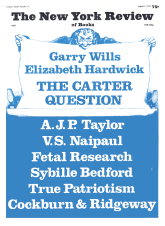In response to:
Is There Hope for English? from the May 27, 1976 issue
To the Editors:
I don’t think Richard Ohmann needs to have me held up as an example to him, as your reviewer tries to do in his account of Ohmann’s book, English in America: A Radical View of the Profession [NYR, May 27]. His book (along with others such as Bowles’ and Gintis’ Schooling in a Capitalist America [Basic Books, 1976, also recently reviewed in your pages] and H. Bruce Franklin’s political autobiography, Back Where You Came From [Harper’s Magazine Press, 1975]) is essential reading for teachers of literature who want to face up to the unpleasant contradictions of our work within the institutions. Here, certainly, we must agree with C.L. Barber when he observes: “To counter that we cannot be responsible for a world we never made will not do in a time when the mood of desperate protest about Vietnam is being succeeded by profound dismay about the huge organization for exploitation, at home and abroad, of which we become increasingly aware as its failure to function becomes more obvious. We do depend on that exploitation and, like it or not, contribute to it.”
But Professor Barber goes on to imply that there is some sort of incompatibility between such awareness of our structural relationship to this society and an appreciation of “the radical potential of literature itself.” The idea that literature is by virtue of its very form critical of its social content, that it calls into question and negates the institutions from which it emerges, is a basic feature of one important tradition of radical aesthetics (the Frankfurt School, and also Sartre). On the other hand, it is surely undeniable that, at least since the Thirties, the entire force of the Anglo-American critical tradition has been marshalled in an effort to contain and to neutralize precisely those critical or negative tendencies; it ought not to be necessary to enumerate all these well-known strategies, which range from the reduction of literature to belles-lettres all the way to the standard readings of the canon in terms of individual psychology (identity crises, the “self”), of existential and metaphysical dilemmas (death, finitude, the meaninglessness of the human condition), and/or myths and symbols of all of these preoccupations. It is hard to see how students could be made to feel the force of the “radical potential” of which Professor Barber speaks unless they are exposed to radical alternatives to such ahistorical, anti-political, and privatizing uses of literature. Nor does it strike me as very realistic to hope that the same teachers who dislike reading the uncomfortable facts detailed in Richard Ohmann’s book will be very effective in conveying such potential, in the unlikely event they felt like doing so. Literature does not teach itself, however; nor is the study of literature a polite social occasion, but rather a battleground of rival ideological paradigms. Contrary to Professor Barber’s implication, it is hard to see how you can separate a feeling for the critical, negative, radicalizing function of literature from an active sympathy with radical teaching and with radical teachers themselves.
Ohmann’s book ought, it seems to me, to have been the occasion for a different kind of reminder, namely, that those who are troubled by the facts of life in our profession without being prepared themselves to embrace a more genuinely revolutionary view of the world (and of literary study) have a fundamental responsibility nonetheless: to resist the current trend to use the economic crisis in higher education as a pretext for firing as many as possible of those younger radical faculty hired as tokenism at the height of political awareness in the late Sixties and early Seventies. An intellectual interest in the development of a left or Marxist culture in the US is futile if it is not accompanied by acts of tangible support such as this.
Frederic R. Jameson
Department of Literature
University of California, San Diego
La Jolla, California
This Issue
August 5, 1976



